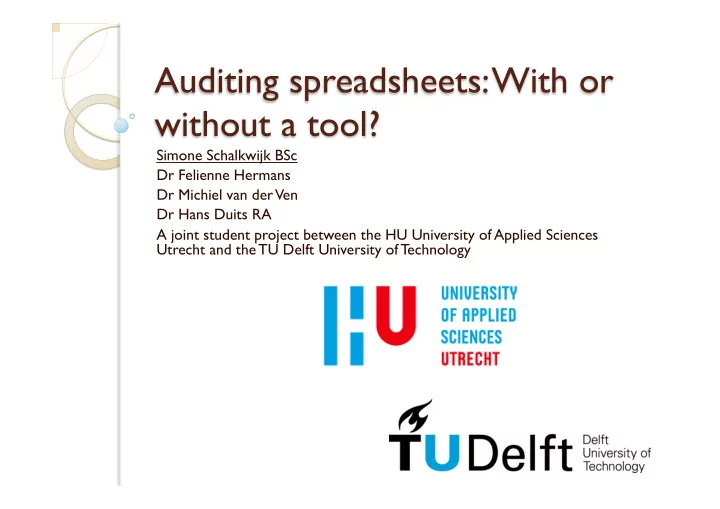

Auditing spreadsheets: With or without a tool? Simone Schalkwijk BSc Dr Felienne Hermans Dr Michiel van der Ven Dr Hans Duits RA A joint student project between the HU University of Applied Sciences Utrecht and the TU Delft University of Technology
Why this research? Excel horror stories Errors in spreadsheets post a major threat for the auditor in terms of financial damage and image damage Previous research showed mixed results on the usefulness of spreadsheet tools for auditing in general
What did we want to know? R1 Are common errors recognized by auditors? R2 To what extent does PerfectXL contribute to a more efficient and effective audit? R3 Which functionalities should PerfectXL possess in order to contribute towards a more efficient and effective audit?
How did we perform this research? Semi-structured interviews with 8 auditors of a big 4 audit firm with a working experience of over four years PerfectXL demo
What are the results of this research? Some common errors are agreed upon Most auditors have a positive attitude towards the visualization functionality Mixed opinions on the risk analysis functionality whereas most auditors where doubtful on the impact on efficiency and effectiveness of the audit
Visualization: The most valued functionality of PerfectXL
Visualization: Some side effects
Risk analysis: Some auditors doubted the usefulness of this functionality
What did we learn from this research? Some common errors are recognized by auditors Visualization is useful in order to perform a more efficient and effective audit Results might apply to other spreadsheet auditing tools
Suggestions for future research Quantitative effects could be measured during an experiment Aim should not be to look at correctly flagging errors by PerfectXL but should rather focus on differences in effectiveness and efficiency within the audit
Recommend
More recommend